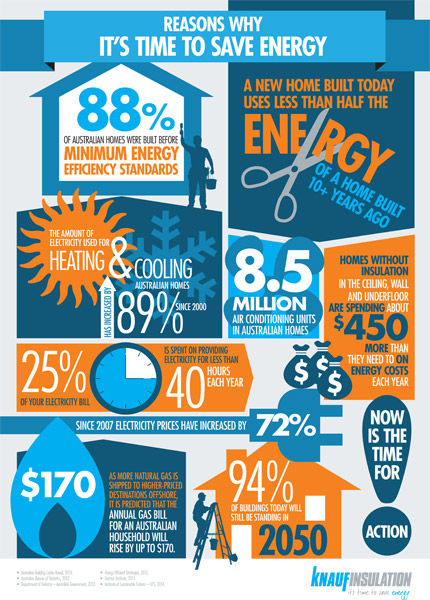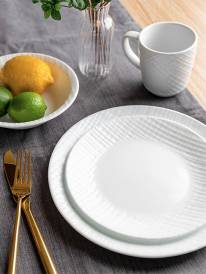Ravi Chandra Insulation Would Save Australia $500 million Interview

Ravi Chandra Insulation Would Save Australia $500 million
The repeal of Carbon Tax by the Abbott government is a move that will hopefully reduce household energy bills, however, the decision just scratches the surface of how Australians can reduce energy costs. Figures from Knauf Insulation show uninsulated properties in Australia are costing the country around $500 million per year, with energy generated to keep these properties cool in summer and warm in winter disappearing out of underfloors, ceilings and walls.
Despite the cost of energy rising at an unprecedented level, those renting properties are worst affected - 1 in 5 households who rent do not know if they are wasting money heating and cooling an uninsulated property. This figure is almost twice the proportion of homeowners who are unaware.
On average, a family living in an uninsulated building will spend around $450 per year more than they need to on energy; with the cost of electricity having already risen by 72% since 2007. Moreover, the demand for energy has also risen - electricity used for heating and cooling properties in Australia has increased by 89% since 2000, which can probably be attributed to the staggering 8.5 million air conditioning units installed in Australian homes.
Knauf Insulation estimates there are over one million homes still without insulation. Ravi Chandra, General Manager for Regulatory Affairs and Public Policy at Knauf Insulation Australia and New Zealand says:
'Yesterday's axing of the Carbon Tax will give consumers some relief against increasing household bills but it's only the beginning – there's still a long way to go. While the Carbon Tax is dead, rising energy costs remain alive and kicking, burning a hole in the back pockets of millions of Australians. The heavy lifting needed to protect homes from rising energy costs starts now.
'What axing the tax won't fix is that almost nine out every ten Australian homes were built before minimum energy efficiency standards – millions of households are wasting money on energy without even realising it."
Last year, Knauf Insulation took on its own project to help educate Australian's about the benefits of insulation. They worked with local residents and the Birdsville council to insulate every viable property in the remote outback town known for its extreme temperatures. New figures show the average residential home in Birdsville has saved over 20% on its energy bills since the Earthwool® insulation went in. Birdsville resident, Neale McShane, saved $138 dollars on his electricity bill for the period October 2013 – January 2014 compared to same period last year.
In total, enough Earthwool to cover a football field was trucked 1500kms from Brisbane to Birdsville and DIY installed into houses and famous businesses such as the Birdsville Hotel and the Birdsville Bakery. Each year in Birdsville temperatures range from 50 degrees in summer, to nearly freezing on winter nights. The elaborate product demonstration, highlighted the huge difference insulation can have on quality of living.
The town most recently won the Tidy Towns Award for Energy Conservation. A short film of the project has been made and is available to view on YouTube
 Interview with Ravi Chandra from Knauf Insulation Australia and New Zealand
Interview with Ravi Chandra from Knauf Insulation Australia and New Zealand
Question: How can we save money this winter on our household bills?
Ravi Chandra:
It's best to start by reducing the energy you use for heating. Heating and cooling represents about 40 per cent of the average household energy bill. One of the best ways to reduce these costs is to install insulation around the home: in ceilings, walls and under floors. It can make a big dint on your household bills as the average home without ceiling, wall and underfloor insulation spends up to $450 more than they need to on energy bills per year.
Question: How does saving money mean we can become more energy efficient?
Ravi Chandra: Improving your home's energy efficiency by installing insulation means that you can use less energy to stay comfortable during winter. Energy waste is a big problem in Australia – millions of Australians homes are wasting energy without even knowing it. Alarmingly nine in every ten homes were built before minimum energy efficiency standards started.
Question: How will insulation behind keep the house warm in winter and cool in summer?
Ravi Chandra: Heat will naturally flow from areas where it's hot to areas where it's cold. Insulation acts as barrier to disrupt this natural flow: it keeps the heat out in summer and keeps it in during winter. Last year we set out to prove the effectiveness of insulation all year round by insulating the entire town of Birdsville, which is well known for its extreme temperatures. Temperatures in Birdsville can range from 50 degrees in the summer to nearly freezing on winter nights. Latest figures show that the average residential home in Birdsville saved 20% on its energy bills since the insulation was installed.
Question: What other benefits will adding insulation to our homes have?
Ravi Chandra: When your home is using less energy, this means lower energy bills. Some types of insulation like Knauf Insulation's Earthwool® insulation, also have significant sound proofing properties that can help cut down on outside noises as well as unwanted noises within the home. There's also growing research from around the world which shows that improving a home's thermal comfort can have health benefits too – less visits to the doctor and less sick days from work or school.
Question: How can we find out if we have insulation, already?
Ravi Chandra: If you're not sure if you have insulation or not, it's a good idea to check with the previous owners, or simply pop into the ceiling space for a quick look. Before you enter the ceiling space, it's recommended that you turn off all main switches on your switchboard. For underfloor insulation, if it's safe to do so and is accessible, check the crawl space under the house. If you're still unsure or just too busy there's always the option of hiring a professional.
Question: How easy is it to add insulation to our homes?
Ravi Chandra:
Installing insulation is a common DIY activity all over the world. It is easy and safe provided that basic safety steps are followed such as: switching the power off at the mains, wearing the right clothing with flat soled shoes and being careful to only step on the joists in the ceiling space. Knauf Insulation's Earthwool® insulation contains safety and installation instructions on the packaging as well as more detailed information on the website. We've also created easy-to-follow, DIY videos on our website: http://www.knaufinsulation.com.au/ and we would recommend these are reviewed before starting any installation.
Question: Are we talking about roof and or wall insulation?
Ravi Chandra: Both ceiling and wall insulation can be installed DIY and both can reduce energy costs. Ceiling insulation can save up to 40 per cent on heating and cooling costs and wall insulation can save around 20 per cent on heating and cooling costs.
Question: How much should adding insulation to our homes save in household bills?
Ravi Chandra:
Each home is different – and so is the energy consumption of each family – so it's difficult to pin down an exact figure of how much everyone will save. The average home in Australia could save up to $450 per year by adding insulation.
Interview by Brooke Hunter
MORE



